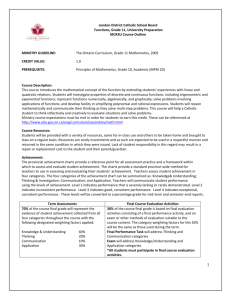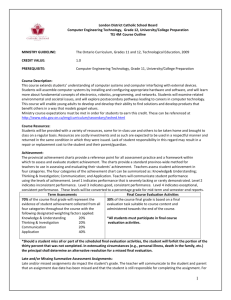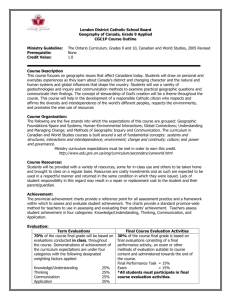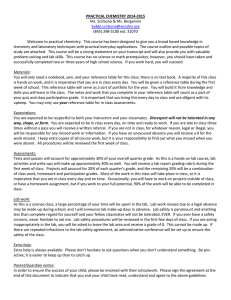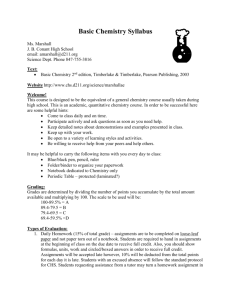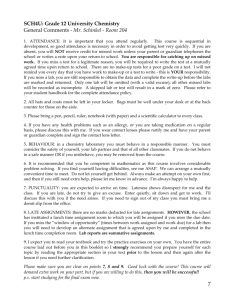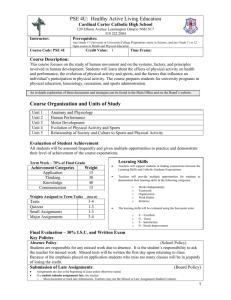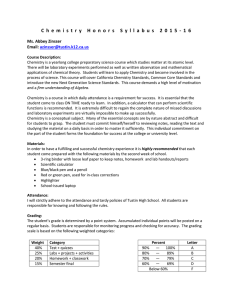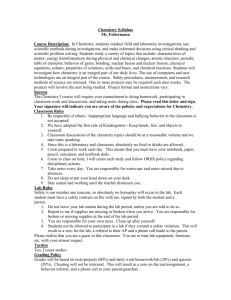JOHN PAUL II CATHOLIC SECONDARY SCHOOL
advertisement
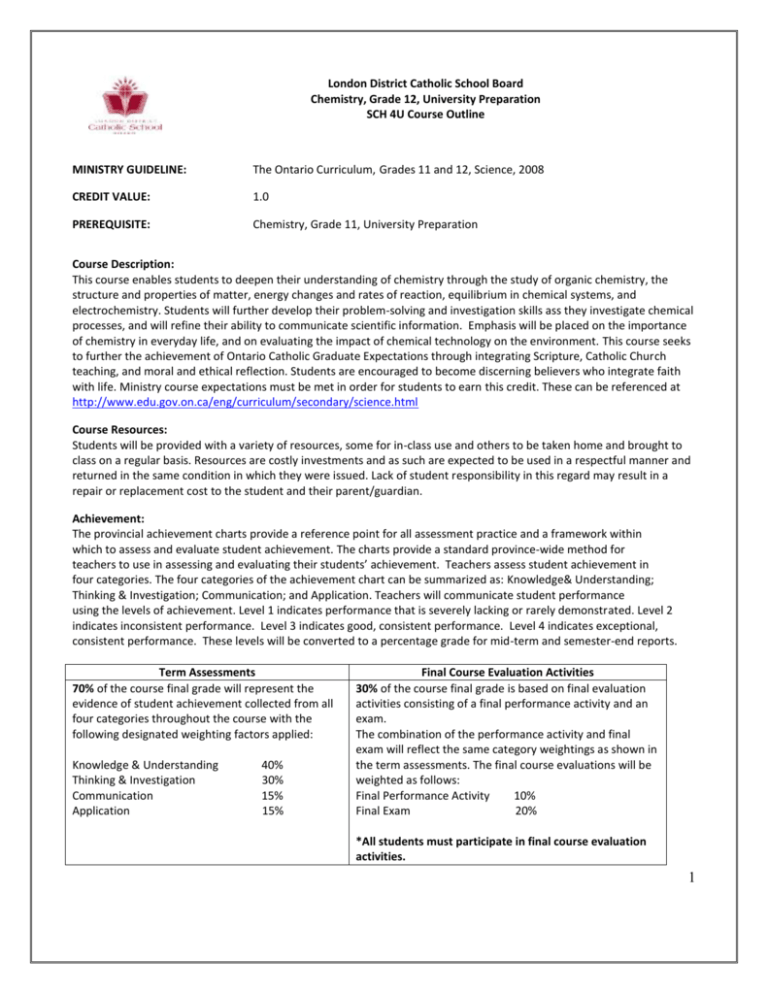
London District Catholic School Board Chemistry, Grade 12, University Preparation SCH 4U Course Outline MINISTRY GUIDELINE: The Ontario Curriculum, Grades 11 and 12, Science, 2008 CREDIT VALUE: 1.0 PREREQUISITE: Chemistry, Grade 11, University Preparation Course Description: This course enables students to deepen their understanding of chemistry through the study of organic chemistry, the structure and properties of matter, energy changes and rates of reaction, equilibrium in chemical systems, and electrochemistry. Students will further develop their problem-solving and investigation skills ass they investigate chemical processes, and will refine their ability to communicate scientific information. Emphasis will be placed on the importance of chemistry in everyday life, and on evaluating the impact of chemical technology on the environment. This course seeks to further the achievement of Ontario Catholic Graduate Expectations through integrating Scripture, Catholic Church teaching, and moral and ethical reflection. Students are encouraged to become discerning believers who integrate faith with life. Ministry course expectations must be met in order for students to earn this credit. These can be referenced at http://www.edu.gov.on.ca/eng/curriculum/secondary/science.html Course Resources: Students will be provided with a variety of resources, some for in-class use and others to be taken home and brought to class on a regular basis. Resources are costly investments and as such are expected to be used in a respectful manner and returned in the same condition in which they were issued. Lack of student responsibility in this regard may result in a repair or replacement cost to the student and their parent/guardian. Achievement: The provincial achievement charts provide a reference point for all assessment practice and a framework within which to assess and evaluate student achievement. The charts provide a standard province-wide method for teachers to use in assessing and evaluating their students’ achievement. Teachers assess student achievement in four categories. The four categories of the achievement chart can be summarized as: Knowledge& Understanding; Thinking & Investigation; Communication; and Application. Teachers will communicate student performance using the levels of achievement. Level 1 indicates performance that is severely lacking or rarely demonstrated. Level 2 indicates inconsistent performance. Level 3 indicates good, consistent performance. Level 4 indicates exceptional, consistent performance. These levels will be converted to a percentage grade for mid-term and semester-end reports. Term Assessments 70% of the course final grade will represent the evidence of student achievement collected from all four categories throughout the course with the following designated weighting factors applied: Knowledge & Understanding Thinking & Investigation Communication Application 40% 30% 15% 15% Final Course Evaluation Activities 30% of the course final grade is based on final evaluation activities consisting of a final performance activity and an exam. The combination of the performance activity and final exam will reflect the same category weightings as shown in the term assessments. The final course evaluations will be weighted as follows: Final Performance Activity 10% Final Exam 20% *All students must participate in final course evaluation activities. 1 *Should a student miss all or part of the scheduled final evaluation activities, the student will forfeit the portion of the thirty percent that was not completed. In extenuating circumstances (e.g., personal illness, death in the family, etc.) the principal shall determine an alternative resolution for a missed final evaluation. Late and/or Missing Summative Assessment Assignments: Late and/or missed assignments do impact the student’s grade. The teacher will communicate to the student and parent that an assignment due date has been missed and that the student is still responsible for completing the assignment. For more detailed information about late and missed assignments and academic misconduct (skipping, cheating, and plagiarism) refer to the Procedure for Dealing with Academic Misconduct and Late and Missing Assignments. Learning Skills and Work Habits: The report card provides a record of the learning skills demonstrated by the student in every course, in the following six categories: responsibility, organization, independent work, collaboration, initiative, and self-regulation. Learning Skills and Work Habits are evaluated using a four-point scale (E–Excellent, G–Good, S–Satisfactory, N–Needs Improvement). The separate evaluation and reporting of the learning skills reflects their critical role in students’ achievement of the curriculum expectations. Student and Parent/Guardian Responsibilities: “Students who make the effort required and who apply themselves will soon discover there is a direct relationship between this effort and their achievement, and will therefore be more motivated to work. Successful mastery of concepts and skills in science requires a sincere commitment to work and study. ” (The Ministry of Education, 2005) Students are expected to: attend and be punctual for all classes. bring the necessary learning tools (lined loose leaf paper, graph paper, binder, pencil, eraser, pen, math set, scientific calculator) to every class. complete homework thoroughly and on time. keep notebooks neat and organized. adhere to the School Computer User Policies and the Board Student Internet Access Agreement adhere to board policy with respect to plagiarism adhere to the school uniform code be present for all tests and evaluations; in the case of illness, a Doctor’s note may be required make arrangements with your teacher ahead of time when conflicts arise between school functions (sports, trips, etc.) and tests or assignments. catch up on all notes and work missed when absent. Please get a name and phone number of a classmate who you can call when you are absent to get the notes and homework assigned. Classmate’s Name: _________________ Phone #: _____________________ “Parents have an important role to play in supporting student learning. Studies show that students perform better in school if their parents or guardians are involved in their education. By becoming familiar with the curriculum, parents can find out what is being taught in the courses their children are taking and what students are expected to learn.” (The Ministry of Education, 2005) Parents/Guardians are asked to: encourage your son/daughter to take an active part in the life of the school request to see notebooks and school planner encourage him/her to take advantage of opportunities for extra help become familiar with the curriculum attend school functions and talk to us. Teachers work best when we know the story behind the desk. I have read and carefully considered the expectations of me as a student. I agree to adhere to these expectations. Student Signature _________________________________ Date ________________________ I have discussed the contents of this course outline with my son/daughter and understand what is expected. Parent/Guardian Signature _________________________________ Date ________________________ 2 3
